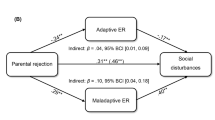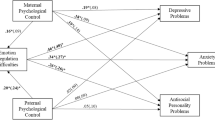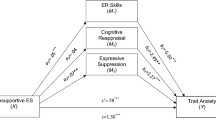Abstract
Boys and girls learn early from their parents about what is appropriate and what is not in terms of emotional expression. We argue that these parental cues can lead to the formation of stigma around emotionality; yet there is a dearth of research on how stigma around emotionality may be formed through societal gender roles and stereotypes related to the expression of emotionality. The current study provides a preliminary investigation of this novel construct – emotionality stigma – as a mediator in the relationship between recalled parental emotion dysregulation (ED) and adult children’s internalizing symptoms. College and community individuals (N = 866) reported their emotionality stigma endorsement, their internalizing symptoms, and their parents' ED. Participants in our sample ranged in age from 18 to 68 years old (M = 28.2, SD = 9.8); 57.9% identified as female, and 61.4% identified as White. Structural equation modeling revealed parent and child gender differences in a mediational model where emotionality stigma significantly mediated the relation between recalled parental ED and adult children’s internalizing symptoms. Specifically, recalled paternal ED emerged as a stronger predictor of adult children’s internalizing symptoms as compared to recalled maternal ED. Furthermore, results showed a stronger indirect effect between maternal and paternal ED and adult children’s internalizing symptoms through emotionality stigma for male children as compared to female children. This research, while preliminary, is the first to demonstrate how parent and child gender interact to influence the relationship between recalled parental ED, emotionality stigma, and internalizing symptoms.


Similar content being viewed by others
Data Availability
The data and materials can be obtained by emailing the first author.
References
Aktar, E., & Bogel, S. M. (2017). Exposure to parents’ negative emotions as a developmental pathway to the family aggregation of depression and anxiety in the first year of life. Clinical Child and Family Psychology Review, 20(4), 369–390. https://doi.org/10.1007/s10567-017-0240-7
Aldao, A., Gee, D. G., De Los Reyes, A., & Seager, I. (2016). Emotion regulation as a transdiagnostic factor in the development of internalizing and externalizing psychopathology: Current and future directions. Development and Psychopathology, 28(4), 927–946. https://doi.org/10.1017/S0954579416000638
Bandura, A. (1989). Social cognitive theory. In R. Vasta (Ed.), Annals of child development: Six theories of child development (Vol. 6, pp. 1–60). JAI Press. https://doi.org/10.4324/9780429052675-22
Bandura, A., Ross, D., & Ross, S. A. (1961). Transmission of aggression through imitation of aggressive models. The Journal of Abnormal and Social Psychology, 63(3), 575–582. https://doi.org/10.1037/h0045925
Bariola, E., Gullone, E., & Hughes, E. K. (2011). Child and adolescent emotion regulation: The role of parental emotion regulation and expression. Clinical Child and Family Psychology Review, 14(2), 198–212. https://doi.org/10.1007/s10567-011-0092-5
Beck, A., Epstein, N., Brown, G., & Steer, R. A. (1988). An inventory for measuring clinical anxiety: Psychometric properties. Journal of Consulting and Clinical Psychology, 56(6), 893–897. https://doi.org/10.1037//0022-006x.56.6.893
Belsley, D. A., Kuh, E., &.Welsch, R. E. (1980). Regression diagnostics: Identifying influential dala and sources of co/linearity. Wiley.
Bentler, P. M. (2006). EQS structural equations program manual. Multivariate Software.
Bohanek, J. G., Marin, K. A., & Fivush, R. (2008). Family narratives, self, and gender in early adolescence. Journal of Early Adolescence, 28(1), 153–176. https://doi.org/10.1177/0272431607308673
Boysen, G. A., & Logan, M. (2017). Gender and mental illness stigma: The relative impact of stereotypical masculinity and gender atypicality. Stigma and Health, 2(2), 83–97. https://doi.org/10.1037/sah0000044
Brody, L. R. (1999). Gender, emotion, and the family. Harvard University Press.
Brown, L. S. (2010). Feminist therapy. American Psychological Association.
Chan, J. Y. N., Mak, W. W. S., & Law, L. S. C. (2009). Combining education and video-based contact to reduce stigma of mental illness: “The same or not the same” anti-stigma program for secondary schools in Hong Kong. Social Science and Medicine, 68(8), 1521–1526. https://doi.org/10.1016/j.socscimed.2009.02.016
Chandra, A., & Minkovitz, C. S. (2006). Stigma starts early: Gender differences in teen willingness to use mental health services. Journal of Adolescent Health, 38(6), 1–8. https://doi.org/10.1016/j.jadohealth.2005.08.011
Chaplin, T. M., & Aldao, A. (2013). Gender differences in emotion expression in children: A meta-analytic review. Psychological Bulletin, 139(4), 735–765. https://doi.org/10.1037/a0030737
Chaplin, T. M., Cole, P. M., & Zahn-Waxler, C. (2005). Parental socialization of emotion expression: Gender differences and relations to child adjustment. Emotion, 5(1), 80–88. https://doi.org/10.1037/1528-3542.5.1.80
Chervonsky, E., & Hunt, C. (2019). Emotion regulation, mental health, and social wellbeing in a young adolescent sample: A concurrent and longitudinal investigation. Emotion, 19(2), 270–282. https://doi.org/10.1037/emo0000432
Cole, P. M., Martin, S. E., & Dennis, T. A. (2004). Emotion regulation as a scientific construct: Methodological challenges and directions for child development research. Child Development, 75(2), 317–333. https://doi.org/10.1111/j.1467-8624.2004.00673.x
Cote, S., Gyurak, A., & Levenson, R. W. (2010). The ability to regulate emotion is associated with greater well-being, income, and socioeconomic status. Emotion, 10(6), 923–933. https://doi.org/10.1037/a0021156
Cumberland-Li, A., Eisenberg, N., Champion, C., Gershoff, E., & Fabes, R. A. (2003). The relation of parental emotionality and related dispositional traits to parental expression of emotion and children’s social functioning. Motivation and Emotion, 27(1), 27–56. https://doi.org/10.1023/A:1023674308969
Eisenberg, N., Valiente, C., Morris, A. S., Fabes, R. A., Cumberland, A., Reiser, M., Gershoff, E. T., Shepard, S. A., & Losoya, S. (2003). Longitudinal relations among parental emotional expressivity, children’s regulation, and quality of socioemotional functioning. Developmental Psychology, 39(1), 3–19. https://doi.org/10.1037/0012-1649.39.1.3
Fisak, B., & Grills-Taquechel, A. E. (2007). Parental modeling, reinforcement, and information transfer: Risk factors in the development of child anxiety? Clinical Child and Family Psychology, 10(3), 213–231. https://doi.org/10.1007/s10567-007-0020-x
Fischbach, A., Lichtenthaler, P. W., & Horstmann, N. (2015). Leadership and gender stereotyping of emotions: Think manager-think male? Journal of Personnel Psychology, 14(3), 153–162. https://doi.org/10.1027/1866-5888/a000136
Gallegos, M. I., Murphy, S. E., Benner, A. D., Jacobvitz, D. B., & Hazen, N. L. (2017). Marital, parental, and whole-family predictors of toddlers’ emotion regulation: The role of parental emotional withdrawal. Journal of Family Psychology, 31(3), 294–303. https://doi.org/10.1037/fam0000245
Gemma, M., James, P., Lloyd, S., Wilfred, J., & Sellwood, W. (2017). Guilt, shame and expressed emotion in carers of people with long-term mental health difficulties: A systematic review. Psychiatry Research, 249, 139–151. https://doi.org/10.1016/j.psychres.2016.12.056
Gitay, M. N., Fatima, S., Arshad, S., Arshad, B., Ehtisham, A., Baig, M. A., Ilyas, M. F., Rizvi, S. F., Farooqui, Q., Masroor, M., & Haque, Z. (2018). Gender differences and prevalence of mental health problems in students of healthcare units. Community Mental Health Journal, 55, 849–853. https://doi.org/10.1007/s10597-018-0304-2
Goodman, S. H., Rouse, M. H., Connell, A. M., Broth, M. R., Hall, C. M., & Heyward, D. (2011). Maternal depression and child psychopathology: A meta-analytic review. Clinical Child and Family Psychology Review, 14(1), 1–27. https://doi.org/10.1007/s10567-010-0080-1
Gottman, J. M., Katz, L. F., & Hooven, C. (1996). Parental meta-emotion philosophy and the emotional life of families: Theoretical models and preliminary data. Journal of Family Psychology, 10(3), 243–268. https://doi.org/10.1037//0893-3200.10.3.243
Gottman, J. M., Katz, L. F., & Hooven, C. (1997). Meta-Emotion: How families communicated emotionally. Lawrence Erlbaum Associates.
Granat, A., Gadassi, R., Gilboa-Schechtman, E., & Feldman, R. (2017). Maternal depression and anxiety, social synchrony, and infant regulation of negative and positive emotions. Emotion, 17(1), 11–27. https://doi.org/10.1037/emo0000204
Gratz, K. L., & Roemer, L. (2004). Multidimensional assessment of emotion regulation and dysregulation: Development, factor structure, and initial validation of the difficulties in emotion regulation scale. Journal of Psychopathology & Behavioral Assessment, 26(1), 41–54. https://doi.org/10.1023/B:JOBA.0000007455.08539.94
Gross, J. J. (1999). Emotion and emotion regulation. In L. A. Pervin & O. P. John (Eds.), Handbook of personality: Theory and research (2nd ed., pp. 525–552). Guilford Press.
Heesacker, M., Wester, S. R., Vogel, D. L., Wentzel, J. T., Mejia-Millan, C. M., & Goodholm, C. R. (1999). Gender-based emotional stereotyping. Journal of Counseling Psychology, 46(4), 483–495. https://doi.org/10.1037/0022-0167.46.4.483
Hoemann, K., & Feldman Barrett, L. (2019). Concepts dissolve artificial boundaries in the study of emotion and cognition, uniting body, brain, and mind. Cognition and Emotion, 33(1), 67–76. https://doi.org/10.1080/02699931.2018.1535428
Jackson, D. L. (2003). Revisiting sample size and the number of parameter estimates: Some support for the N:Q hypothesis. Structural Equation Modeling, 10(1), 128–141. https://doi.org/10.1207/S15328007SEM1001_6
Joo, S. H., & Kim, E. S. (2019). Impact of error structure misspecification when testing measurement invariance and latent-factor mean difference using MIMIC and multiple-group confirmatory factor analysis. Behavior Research Methods, 51(6), 2688–2699. https://doi.org/10.3758/s13428-018-1124-6
Kelly, J. R., & Hutson-Comeaux, S. L. (1999). Gender-emotion stereotypes are context specific. Sex Roles, 40(1–2), 107–120. https://doi.org/10.1023/A:1018834501996
Kennedy Root, A., & Rubin, K. H. (2010). Gender and parents’ reactions to children’s emotion during the preschool years. New Directions for Child and Adolescent Development, 2010(128), 51–64. https://doi.org/10.1002/cd.268
Koole, S. L. (2009). The psychology of emotion regulation: An integrative review. Cognition and Emotion, 23(1), 4–41. https://doi.org/10.1080/02699930802619031
Maxwell, S. E., & Cole, D. A. (2007). Bias in cross-sectional analyses of longitudinal mediation. Psychological Methods, 12(1), 23–44. https://doi.org/10.1037/1082-989X.12.1.23
McDowell, D. J., Kim, M., & O’neil, R., & Parke, R. D. (2002). Children’s emotional regulation and social competence in middle childhood. Marriage & Family Review, 34(3–4), 345–364. https://doi.org/10.1300/J002v34n03_07.
Molina, P., Sala, M. N., Zappulla, C., Bonfigliuoli, C., Cavioni, V., Zanetti, M. A., Baiocco, R., Laghi, F., Pallini, S., De Stasio, S., Raccanello, D., & Cicchetti, D. (2014). Emotion Regulation Checklist--Italian Version. Validation of parent and teacher versions. European Journal of Developmental Psychology, 11(5), 624–634. https://doi.org/10.1080/17405629.2014.898581
Pederson, E. L., & Vogel, D. L. (2007). Male gender role conflict and willingness to seek counseling: Testing a mediation model on college-aged men. Journal of Counseling Psychology, 54(4), 373–384. https://doi.org/10.1037/0022-0167.54.4.373
Pescosolido, B. A., & Martin, J. K. (2015). The stigma complex. Annual Review of Sociology, 41, 87–116. https://doi.org/10.1146/annurev-soc-071312-145702
Quinn, K. A., & Rosenthal, H. E. S. (2012). Categorizing others and the self: How social memory structures guide social perception and behavior. Learning and Motivation, 43(4), 247–258. https://doi.org/10.1016/j.lmot.2012.05.008
Radloff, L. S. (1977). A self-report depression scale for research in the general population. Applied Psychological Measurement, 1(3), 385–401. https://doi.org/10.1037/t02942-000
Ritsher, J. B., Otilingam, P. G., & Grajales, M. (2003). Internalized stigma of mental illness: Psychometric properties of a new measure. Psychiatry Research, 121(1), 31–49. https://doi.org/10.1016/j.psychres.2003.08.008
Rusby, J. C., Light, J. M., Crowley, R., & Westling, E. (2018). Influence of parent – youth relationship, parental monitoring, and parent substance use on adolescent substance use onset. Journal of Family Psychology, 32(3), 310–320. https://doi.org/10.1037/fam0000350
Rüsch, N., Angermeyer, M. C., & Corrigan, P. W. (2005). Mental illness stigma: Concepts, consequences, and initiatives to reduce stigma. European Psychiatry, 20(8), 529–539. https://doi.org/10.1016/j.eurpsy.2005.04.004
Safdar, S., Friedlmeier, W., Matsumoto, D., Yoo, S. H., Kwantes, C. T., Kakai, H., & Shigemasu, E. (2009). Variations of emotional display rules within and across cultures: A comparison between Canada, USA, and Japan. Canadian Journal of Behavioral Science, 41(1), 1–10. https://doi.org/10.1037/a0014387
Schleider, J. L., & Weisz, J. R. (2017). Family process and youth internalizing problems: A triadic model of etiology and intervention. Development and Psychopathology, 29(1), 273–301. https://doi.org/10.1017/S095457941600016X
Shields, A., & Cicchetti, D. (1997). Emotion regulation among school-age children: The development and validation of a new criterion Q-sort scale. Developmental Psychology, 33(6), 906–916. https://doi.org/10.1037//0012-1649.33.6.906
Smith, S. M., Holtrop, K., & Reynolds, J. (2015). Do positive parenting practices moderate parental mental health and child behavior among homeless families? Family Relations, 64(5), 606–620. https://doi.org/10.1111/fare.12166
Topkaya, N. (2014). Gender, self-stigma, and public stigma in predicting attitudes toward psychological help-seeking. Educational Sciences: Theory & Practice, 14(2), 480–488. https://doi.org/10.12738/estp.2014.2.1799
Trautmann, S., Rehm, J., & Wittchen, H. (2016). The economic costs of mental disorders. EMBO Reports, 17(9), 1245–1249. https://doi.org/10.15252/embr.201642951
Triandis, H. C., & Gelfand, M. J. (1998). Converging measurement of horizontal and vertical individualism and collectivism. Journal of Personality and Social Psychology, 74(1), 118–128. https://doi.org/10.1037/0022-3514.74.1.118
Van Van Humbeeck, G., Van Van Audenhove, C., Storms, G., Hert, M. D., Pieters, G., Vertommen, H., Peuskens, J., & Heyrman, J. (2004). Expressed emotion in the client-professional dyad. European Journal of Psychological Assessment, 20(4), 237–246. https://doi.org/10.1027/1015-5759.20.4.237
Vogel, D. L., Heimerdinger-Edwards, S. R., Hammer, J. H., & Hubbard, A. (2011). “Boys don’t cry”: Examination of the links between endorsement of masculine norms, self-stigma, and help-seeking attitudes for, men from diverse backgrounds. Journal of Counseling Psychology, 58(3), 368–382. https://doi.org/10.1037/a0023688
Wang, J., Fick, G., Adair, C., & Lai, D. (2007). Gender specific correlates of stigma toward depression in a Canadian general population sample. Journal of Affective Disorders, 103(1–3), 91–97. https://doi.org/10.1016/j.jad.2007.01.010
Zeman, J., Cassano, M., & Adrian, M. C. (2012). Socialization influences on children’s and adolescents’ emotional self-regulation processes. Handbook of Self-Regulatory Processes in Development, New Directions and International Perspectives. Routledge. https://doi.org/10.4324/9780203080719.ch5
Funding
This study was funded by a grant to the first author from Arizona State University’s Office of Knowledge Enterprise Development, Graduate and Professional Student Association, and the Graduate College.
Author information
Authors and Affiliations
Contributions
All authors contributed to the study conception and design, and aided in material preparation, data collection and analysis. The first draft of the manuscript was written by Hayley D. Seely and all authors commented on previous versions of the manuscript. All authors read and approved the final manuscript.
Corresponding author
Ethics declarations
Ethics Approval
The research involved human participants and included an informed consent that was approved by our university’s Institutional Review Board.
Consent to Participate
Participants completed an informed consent prior to participation.
Conflict of Interest
The authors have no conflicts of interest to declare that are relevant to the content of this article.
Additional information
Publisher's Note
Springer Nature remains neutral with regard to jurisdictional claims in published maps and institutional affiliations.
Rights and permissions
About this article
Cite this article
Seely, H.D., Mickelson, K.D. Role of Gender and Emotionality Stigma in Perceived Parental Emotion Dysregulation and Adult Children’s Internalizing Symptoms. Sex Roles 85, 515–527 (2021). https://doi.org/10.1007/s11199-021-01237-2
Accepted:
Published:
Issue Date:
DOI: https://doi.org/10.1007/s11199-021-01237-2




